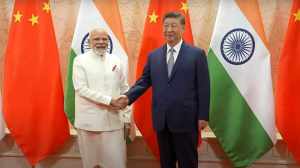
In a report released in July, the International Monetary Fund (IMF) lowered its economic forecast for the world’s three biggest economies: the United States, China and Europe, which are experiencing slower than expected growth. The predicted slowdown is a combination of multiple factors like surging inflation, the ongoing war in Ukraine, China’s slowdown, depreciating currencies, and tighter monetary policy around the world. The IMF expects the world economy to grow just 3.2 per cent this year, down from 6.1 per cent in 2021. Next year is predicted to be even worse at just 2.9 per cent growth.
Since inflation is a measure of purchasing power, when prices go up, people are able to afford even less. In the US, prices of gas and groceries are at an all-time high. India too is hit by high inflation though not as badly as some of the other large economies.
Sony in fact cited soaring inflation as the reason why it hiked at the price of its console. The Japanese tech major has, however, not raised the price of the PS5 in the US and India for now.
Meta, formerly Facebook, recently raised the price of its two-year-old Quest 2 virtual reality headset by $100. Prices of tech products usually fall over time to keep consumers interested, as component costs decrease and revenue from software and subscriptions increase with a large user base.
Carl Pei-owned Nothing, a relatively new player in the smartphone market, has also raised the price of its debut smartphone by Rs 1,000 in India. The base variant of Nothing Phone (1), which was launched at Rs 32,999, will now cost Rs 33,999.
Story continues below this ad
Samsung, the world’s biggest smartphone and memory chip maker, is bringing its flagship-grade foldable smartphones — the Galaxy Z Fold 4 and Flip 4 — at slightly higher prices to India. The Fold 4 and Flip 4 start at Rs 154,999 and Rs 89,999, respectively — the Fold 3 and Flip 3 started at Rs 149,999 and Rs 84,999, respectively. The Galaxy Watch 5 also comes at a higher price, which is Rs 4000 more expensive than what the company asked for the Galaxy Watch 4.
Microsoft too has raised the price of its Xbox Series X and Series S in India. The flagship Series X console, which was earlier priced at Rs 49,990, now retails for Rs 52,990. The Series S price went from Rs 34,990 to Rs 36,990. While prices of Xbox Series X/Series S remain unchanged in several markets, India prices of these consoles actually went up. Tech companies tweak pricing for a particular market in response to currency fluctuations — the Indian rupee has lost about 7 per cent of its value against the US dollar this year.
Big companies like Samsung, Meta or Sony have the resources to absorb some of the costs and take a hit at margins while keeping the price stable. The PlayStation 5, for instance, is a cash cow for Sony as the gaming console is hard to purchase due to high demand. What is pinching companies like Sony is increasing manufacturing costs as well as the ongoing supply chain crunch, which makes it harder to source key components such as chips that go into the manufacturing of these sophisticated products. The rise in freight charges and COVID-19 outbreaks and lockdowns in China are also taking their toll.
But not all companies are ready to pass on the cost to consumers. Nintendo, for instance, has held the prices of its Switch console despite component costs rising.
Story continues below this ad
‘iPhone 14’ could debut at a higher price
As we enter a busy holiday shopping season next month, all eyes are on how the much the new iPhones will cost when the new smartphone debuts on September 7. Analysts and trade insiders are already expecting a $100 price increase on the iPhone 14 which will replace the iPhone 13. Apple could keep the price of the standard iPhone 14 the same as the last year’s model or keep the price of the iPhone as it is but even if Cupertino passes increased costs to its consumers, the move won’t impact sales of the iPhone.
“The consumer base of [Apple] is very affluent, and is not impacted due to inflation or any other global trends,” Sanyam Chaurasia, Technology Market Analyst at Canalys, tells indianexpress.com.” “Even if Apple increases the price of iPhones, the target consumer for these devices will always buy an iPhone and that’s the reason why we have not seen any impact on Apple’s market share.”
In India, for that matter, the iPhone is becoming the smartphone of choice for young, affluent consumers. Lately, Cupertino is also benefiting from the uptick of premium phones as well as the expansion of distribution networks beyond metro cities in the world’s second-largest smartphone market.








































